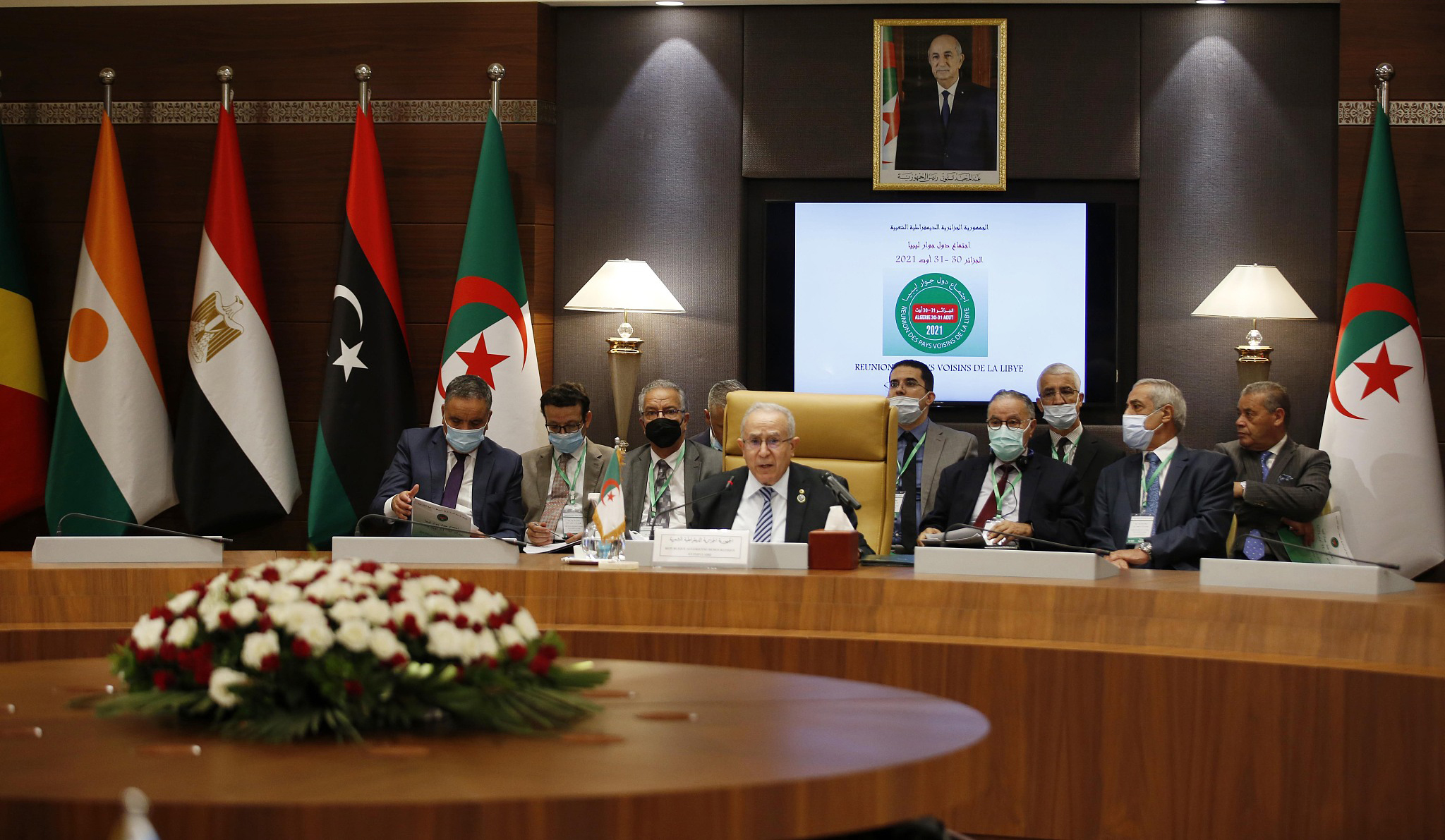In the context of growing concerns regarding the possible collapse of the political process and a return to armed conflict in Libya, representatives from Libya, Egypt, Sudan, Chad, Niger, and Tunisia, the United Nations and the African Union, held a meeting in Algeria on August 30 and 31. The “Meeting of Libya’s Neighboring Countries” concluded with consensus on16 points, which highlight the participants desire to coordinate joint engagement in order to salvage what may be Libya’s last chance to complete the political transition, and prevent throwing the country into a worse situation than that preceding the battle of Tripoli in 2019-2020. The points of agreement cover three main dimensions:
Issues inside Libya: These are related to the political process, particularly elections. Significant emphasis was placed on the importance of timely elections. Other issues include security, particularly with relation to foreign fighters and mercenaries, in addition to condemning the smuggling of weapons and mercenaries, and coordination with the 5+5 group in this regard.
Joint coordination: Participants agreed to activate the neighboring countries’ border security mechanisms, in addition to establishing a ministerial delegation to visit Libya, within the framework of supporting and encouraging the political process, supporting the African Union Commission’s move to hold a conference for Libyan reconciliation, and reactivating the political committee headed by Egypt and the security committee headed by Algeria, which will meet as soon as possible.
External international parties: These parties were called on to support and preserve Libyan sovereignty by refraining from meddling in Libyan affairs. The meeting called on the United Nations and other parties organizing international activities on Libya to involve Libya’s southern neighbors Sudan, Chad, and Niger to participate in these events, having not participated in the Berlin conferences.
Difficulties Ahead
A review of the debates, discourse and conclusions of Libya’s Neighboring Countries Meeting reveals that the road forward in Libya is fraught with many difficulties, these include:
No qualitative breakthroughs: The agreements reached by the meeting cannot be regarded as a qualitative breakthrough, except that they have now been officially adopted as a diplomatic mechanism to be implemented by the participating countries in addressing the Libyan issue. The meeting’s outcomes do not fundamentally differ from the agreements reached at the first meeting in July 2014 in Tunisia. Participants in that meeting also declared support for Libya’s sovereignty, called for stopping armed conflict, and supported UN resolutions on Libya, especially the arms embargo. The latest meeting added references to new Security Council resolutions on Libya, and reactivated the Quartet Border Security Coordination Mechanism established in 2018, which was not implemented as the result the battle of Tripoli in April 2019.
Objections from neighboring countries: While the final statement activated the Quartet Border Security Coordination border security agreement between Libya, Chad, Sudan, and Niger, it is important to note that some of these countries, namely Sudan and Chad, had undertaken a number of preemptive steps prior to the meeting in Algeria. In a visit by Chairman of the Chadian Military Council Mohamed Idriss Deby to Khartoum, he declared his refusal to accept the return of mercenary groups from Libya. Chad also announced a reduction in the number of its forces participating in the anti-terror operation in the African Sahel. Nearly two months prior to that, and within the framework of the meeting of the African Sahel countries, Niger also stressed its rejection of this approach to dealing with Libyan security issues, as it results in the displacement of foreign fighters, mercenaries, organized crime groups, and arms smuggling from Libya to its southern neighbors, creating security crises there.
Absence of mechanisms for implementation: The activation of the political and security committees reflects of the Egyptian-Algerian understanding regarding the Libyan issue, that lacks practical mechanisms of implementation. There are tensions between Algeria and the Libyan National Army, specifically regarding the General Command’s deployment in southern Libya after the two Sabha – Zala terrorist attacks. Algeria also supports the Tuareg within the framework of border control cooperation. While Egypt can play a role in coordinating and reducing the tensions between the two sides, this remains a diplomatic effort. This contrasts with, for example, the European maritime operation Irini, which monitors Libya’s coast, and Germany’s channel of communication with Russia and Turkey to carry out a gradual withdrawal of foreign fighters from Libya. Regional countries have no actual tools to end the foreign military presence in Libya.
Window of opportunity
Conversely, it is important not to underestimate the opportunities provided by this cooperation of Libya’s neighboring countries, which include:
- Enhancing the regional voice in Libya: Despite the aforementioned limitations, the more active participation of Libya’ neighboring countries will enhance their influence vis-à-vis that of extra-regional powers. Libya’s neighbors are thereby ensured a seat at the table in all Libyan events, speaking with one coordinated voice. This constitutes the added value of this mechanism of coordination, as previously, neighboring countries were competing to attract domestic Libyan actors on the one hand, and international and regional powers on the other. Today, for example, Egypt and Tunisia adopt closely similar positions.
- US support: The United States was the first to welcome the meeting and support its outcomes, as it rejects the expansion of threats in southern Libya, and fears that chaos and instability will allow external powers such as Turkey and Russia to expand their presence and influence into the Sahel region. The US perceives that both the Wagner Group and Turkey, are focusing their efforts to infiltrate the Sahel region through Libya. These efforts are supported by Moscow’s attempts to station itself militarily in Sudan, the Turkish presence in Somalia, in conjunction with the decline of the French presence in that region as Operation Barkhane winds down. This opens the way for Moscow and Ankara to fill the void there. While the US is not in a position to stop this expanding influence, most parties to Libyan neighboring countries mechanism perceive their interests to be in line with the American position in this respect , especially with regard to undermining Turkey’s expansion.
- Arab-African coordination: As Libya’s Arab neighbors (Egypt, Tunisia, Algeria) expanded their cooperation and role in Libya, it was conceivable this would cause a backlash Libya’s southern, African neighbors, (Sudan, Chad, and Niger), which adopt a different approach in dealing with the repercussions of the Libyan crisis. Accordingly, bringing these parties into the equation, in addition to supporting their participation in events and conferences on Libya, will help bridge differences. Joint coordination, the exchange of experiences, and security coordination may also reduce tensions, such as those between Chad and the General Command of the Libyan National Army. Chad believes the General Command provided safe haven and weapons to Chadian rebel groups that eventually resulted in the killing of President Deby.
It is important to remember that the mechanism will actively engage with the 5+5 group, which is currently taking the lead in laying out security arrangements in Libya. The aim is to support the Libyan National Army, enabling it to control the country’s borders and eradicate insecurity and chaos in the south. - Coordinated support of Libyan national institutions: The focus of political process at this stage is the National Unity Government in Tripoli, which all parties will seek to support. This will reduce the likelihood of repeating the situation with the Government of National Accord, which enjoyed the support of Tunisia and Algeria while it was at odds with Cairo. The mechanism may also support Libyan initiatives, such as Mohamed El Manfy’s idea to hold a new international conference that would embrace Libya’s own vision regarding its future. It is however doubtful that such an initiative would be welcomed by Western powers, who believe the international vision should be paramount. The Libyan neighboring countries mechanism may be able to play a role in support of the Libyan national vision.
Establishing Presence
In conclusion, it can be argued that there are both opportunities to be gained and limitations to be overcome in respect to the Libyan neighboring countries mechanism. While the mechanism still lacks the tools to implement its stances, the restoration of the mechanism’s momentum is in itself a positive step to redress a prolonged absence. The diplomatic nature of this mechanism has achieved merely the minimal level of coordination and consensus between its members regarding the Libyan crisis. It will face a decisive challenge in its next meetings, the first of which is to be held in Cairo, as Libya’s period of transition draws to a close.


